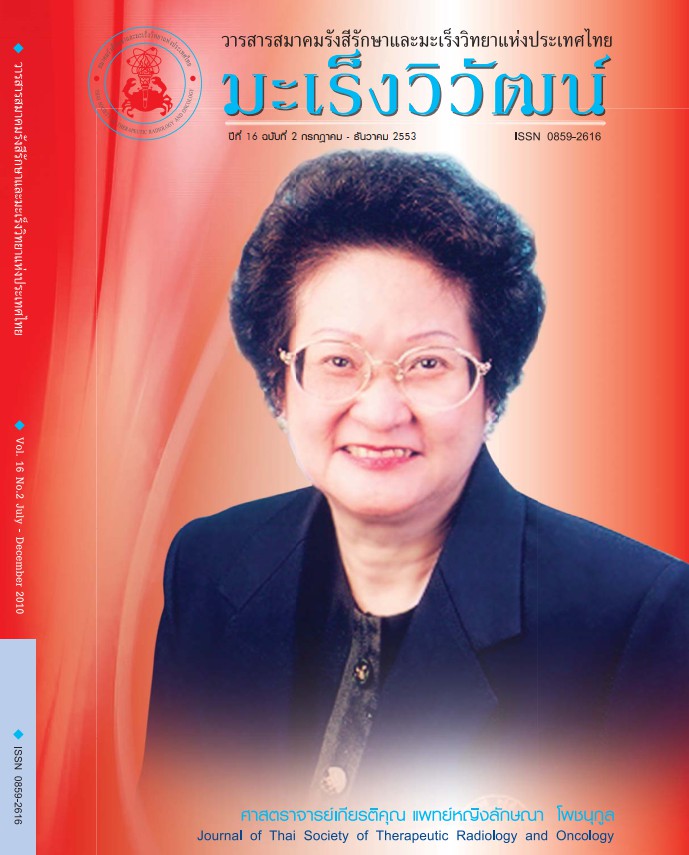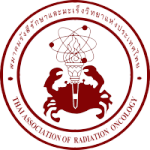แนวทางการ รักษาและการพยากรณ์โรค Medulloblastoma
บทคัดย่อ
โรค medulloblastoma เป็นโรคมะเร็งสมองเด็กชนิดที่พบมากที่สุด โดยพบประมาณร้อยละ 20 ของผู้ป่วยใหม่ โรคเนื้องอกมะเร็งสมองเด็กทั้งหมด ซึ่งจะพบได้ประมาณ 350-400 รายต่อปีในประเทศสหรัฐอเมริกา โดยร้อยละ 70 ของผู้ป่วยโรค medulloblastoma จะได้รับการวินิจฉัยในช่วงก่อนอายุ 20 ปี และมีอุบัติการณ์สูงสุดในกลุ่ม ผู้ป่วยที่มีอายุระหว่าง 5-9 ปี โรค medulloblastoma นี้จะพบได้น้อยมากในกลุ่มผู้ที่มีอายุมากกว่า 40 ปี
เอกสารอ้างอิง
Deutsch, M, Laurent, JP, Cohen, ME. Myelography for staging medulloblastoma. Cancer 1985; 56:1763.
Flannery, AM, Tomita, T, Radkowski, M, McLone, DG. Medulloblastomas in childhood: postsurgical evaluation with myelography and cerebrospinal fl uid cytology. J Neurooncol 1990; 8:149.
O'Reilly, G, Hayward, RD, Harkness, WF. Myelography in the assessment of children with medulloblastoma. Br J Neurosurg 1993; 7:183.
Zeltzer, PM, Boyett, JM, Finlay, JL, et al. Metastasis stage, adjuvant treatment, and residual tumor are prognostic factors for medulloblastoma in children: conclusions from the Children's Cancer Group 921 randomized phase III study. J Clin Oncol 1999; 17:832.
Jenkin, D, Al Shabanah, M, Al Shail, E, et al. Prognostic factors for medulloblastoma. Int J Radiat Oncol Biol Phys 2000; 47:573.
Tabori, U, Sung, L, Hukin, J, et al. Medulloblastoma in the second decade of life: A specific group with respect to toxicity and management. Cancer 2005; 103:1874.
Kim, JY, Sutton, ME, Lu, DJ, et al. Activation of neurotrophin-3 receptor TrkC induces apoptosis of medulloblastomas. Cancer Res 1999; 59:711.
Grotzer, MA, Janss, AJ, Fung, K, et al. TrkC expression predicts good clinical outcome in primitive neuroectodermal brain tumors. J Clin Oncol 2000; 18:1027.
Segal, RA, Goumnerova, LC, Kwon, YK, et al. Expression of the neurotrophin receptor TrkC is linked to a favorable outcome in medulloblastoma. Proc Natl Acad Sci U S A 1994; 91:12867.
Grotzer, MA, Hogarty, MD, Janss, AJ, et al. MYC messenger RNA expression predicts survival outcome in childhood primitive neuroectodermal tumor/medulloblastoma. Clin Cancer Res 2001; 7:2425.
Aldosari, N, Bigner, SH, Burger, PC, et al. MYCC and MYCN oncogene amplification in medulloblastoma. A fl uorescence in situ hybridization study on paraffin sections from the Children's Oncology Group. Arch Pathol Lab Med 2002; 126:540.
Gilbertson, R, Wickramasinghe, C, Hernan, R, et al. Clinical and molecular stratification of disease risk in medulloblastoma. Br J cancer 2001; 85:705.
Gajjar, A, Hernan, R, Kocak, M, et al. Clinical, histopathologic, and molecular markers of prognosis: toward a new disease risk stratification system for medulloblastoma. J Clin Oncol 2004; 22:984.
Pomeroy, SL, Tamayo, P, Gaasenbeek, M, et al. Prediction of central nervous system embryonal tumour outcome based on gene expression. Nature 2002; 415:436.
Fernandez-Teijeiro, A, Betensky, RA, Sturla, LM, et al. Combining gene expression profiles and clinical parameters for risk stratification in medulloblastomas. J Clin Oncol 2004; 22:994.
Liu, R, Wang, X, Chen, GY, et al. The prognostic role of a gene signature from tumorigenic breast-cancer cells. N Engl J Med 2007; 356:217.
Raimondi, AJ, Tomita, T. Medulloblastoma in childhood. Acta Neurochir (Wien) 1979; 50:127.
Park, TS, Hoffman, HJ, Hendrick, EB, et al. Medulloblastoma: clinical presentation and management. Experience at the Hospital for Sick Children, Toronto, 1950-1980. J Neurosurg 1983; 58:543.
Berry, MP, Jenkin, RD, Keen, CW, et al. Radiation treatment for medulloblastoma. A 21-year review. J Neurosurg 1981; 55:43.
Hughes, EN, Shillito, J, Sallan, SE, et al. Medulloblastoma at the Joint Center for Radiation Therapy between 1968 and 1984. The infl uence of radiation dose on the patterns of failure and survival. Cancer 1988; 61:1992.
del Charco, JO, Bolek, TW, McCollough, WM, et al. Medulloblastoma: time-dose relationship based on a 30-year review. Int J Radiat Oncol Biol Phys 1998; 42:147.
Tarbell, NJ, Loeffl er, JS, Silver, B, et al. The change in patterns of relapse in medulloblastoma. Cancer 1991; 68:1600.
Taylor, RE, Bailey, CC, Robinson, K, et al. Results of a randomized study of preradiation chemotherapy versus radiotherapy alone for nonmetastatic medulloblastoma: The International Society of Paediatric Oncology/United Kingdom Children's Cancer Study Group PNET-3 Study. J Clin Oncol 2003; 21:1581.
Fukunaga-Johnson, N, Lee, JH, Sandler, HM, et al. Patterns of failure following treatment for medulloblastoma: is it necessary to treat the entire posterior fossa?. Int J Radiat Oncol Biol Phys 1998; 42:143.
Wolden, SL, Dunkel, IJ, Souweidane, MM, et al. Patterns of failure using a conformal radiation therapy tumor bed boost for medulloblastoma. J Clin Oncol 2003; 21:3079.
St Clair, WH, Adams, JA, Bues, M, et al. Advantage of protons compared to conventional X-ray or IMRT in the treatment of a pediatric patient with medulloblastoma. Int J Radiat Oncol Biol Phys 2004; 58:727.
Yuh, GE, Loredo, LN, Yonemoto, LT, et al. Reducing toxicity from craniospinal irradiation: using proton beams to treat medulloblastoma in young children. Cancer J 2004; 10:386.
Huang, E, Teh, BS, Strother, DR, et al. Intensity-modulated radiation therapy for pediatric medulloblastoma: early report on the reduction of ototoxicity. Int J Radiat Oncol Biol Phys 2002; 52:599.
Narayana, A, Jeswani, S, Paulino, AC. The cranial-spinal junction in medulloblastoma: does it matter?. Int J Radiat Oncol Biol Phys 1999; 44:81.
Thomas, PR, Deutsch, M, Kepner, JL, et al. Low-stage medulloblastoma: fi nal analysis of trial comparing standard-dose with reduced-dose neuraxis irradiation. J Clin Oncol 2000; 18:3004.
Jenkin, D, Danjoux, C, Greenberg, M. Subsequent quality of life for children irradiated for a brain tumor before age four years. Med Pediatr Oncol 1998; 31:506.
Goldwein, JW, Radcliffe, J, Johnson, J, et al. Updated results of a pilot study of low dose craniospinal irradiation plus chemotherapy for children under fi ve with cerebellar primitive neuroectodermal tumors (medulloblastoma). Int J Radiat Oncol Biol Phys 1996; 34:899.
Xu, W, Janss, A, Packer, RJ, et al. Endocrine outcome in children with medulloblastoma treated with 18 Gy of craniospinal radiation therapy. Neuro-oncol 2004; 6:113.
Duffner, PK, Krischer, JP, Horowitz, ME, et al. Second malignancies in young children with primary brain tumors following treatment with prolonged postoperative chemotherapy and delayed irradiation: a Pediatric Oncology Group study [see comments]. Ann Neurol 1998; 44:313.
Bull, KS, Spoudeas, HA, Yadegarfar, G, Kennedy, CR. Reduction of health status 7 years after addition of chemotherapy to craniospinal irradiation for medulloblastoma: a follow-up study in PNET 3 trial survivors on behalf of the CCLG (formerly UKCCSG). J Clin Oncol 2007; 25:4239.
Laughton, SJ, Merchant, TE, Sklar, CA, et al. Endocrine outcomes for children with embryonal brain tumors after risk-adapted craniospinal and conformal primary-site irradiation and high-dose chemotherapy with stem-cell rescue on the SJMB-96 trial. J Clin Oncol 2008; 26:1112.
Garwicz, S, Anderson, H, Olsen, JH, et al. Second malignant neoplasms after cancer in childhood and adolescence: a population-based case-control study in the 5 Nordic countries. The Nordic Society for Pediatric Hematology and Oncology. The Association of the Nordic Cancer Registries. Int J Cancer 2000; 88:672.
Stavrou, T, Bromley, CM, Nicholson, HS, et al. Prognostic factors and secondary malignancies in childhood medulloblastoma. J Pediatr Hematol Oncol 2001; 23:431.
Neglia, JP, Friedman, DL, Yasui, Y, et al. Second malignant neoplasms in fi ve-year survivors of childhood cancer: childhood cancer survivor study. J Natl Cancer Inst 2001; 93:618.
Devarahally, SR, Severson, RK, Chuba, P, et al. Second malignant neoplasms after primary central nervous system malignancies of childhood and adolescence. Pediatr Hematol Oncol 2003; 20:617.
Wisoff, JH, Epstein, FJ. Pseudobulbar palsy after posterior fossa operation in children. Neurosurgery 1984; 15:707.
Rekate, HL, Grubb, RL, Aram, DM, et al. Muteness of cerebellar origin. Arch Neurol 1985; 42:697.
Janssen, G, Messing-Junger, AM, Engelbrecht, V, et al. Cerebellar mutism syndrome. Klin Padiatr 1998; 210:243.
Siffert, J, Poussaint, TY, Goumnerova, LC, et al. Neurological dysfunction associated with postoperative cerebellar mutism. J Neurooncol 2000; 48:75.
ดาวน์โหลด
เผยแพร่แล้ว
รูปแบบการอ้างอิง
ฉบับ
ประเภทบทความ
สัญญาอนุญาต
บทความที่ได้รับการตีพิมพ์เป็นลิขสิทธิ์ของวารสารมะเร็งวิวัฒน์ ข้อความที่ปรากฏในบทความแต่ละเรื่องในวารสารวิชาการเล่มนี้เป็นความคิดเห็นส่วนตัวของผู้เขียนแต่ละท่านไม่เกี่ยวข้องกับ และบุคคลากรท่านอื่น ๆ ใน สมาคมฯ แต่อย่างใด ความรับผิดชอบองค์ประกอบทั้งหมดของบทความแต่ละเรื่องเป็นของผู้เขียนแต่ละท่าน หากมีความผิดพลาดใดๆ ผู้เขียนแต่ละท่านจะรับผิดชอบบทความของตนเองแต่ผู้เดียว




